Analyzing Stalin's Role as a War Leader: Historical Assessments
VerifiedAdded on 2023/04/11
|10
|2364
|454
Essay
AI Summary
This essay examines how historians have assessed Joseph Stalin as a war leader during the Great Patriotic War. It acknowledges Stalin's central role and heroic image while also addressing questions about his failed military policies. The essay delves into different historical interpretations, highlighting fluctuating morale and motivation within the Soviet Union during the war, and various rationalizations influencing people's thinking beyond Stalinism. It further explores Stalin's foreign policies, his relationships with European leaders, and his involvement in decision-making after the German invasion, noting his increasing trust in his generals. The essay concludes by emphasizing the complexities of portraying Stalin, recognizing both his successes and his role in mass violence, and underscoring the continuing debate among historians about his leadership.
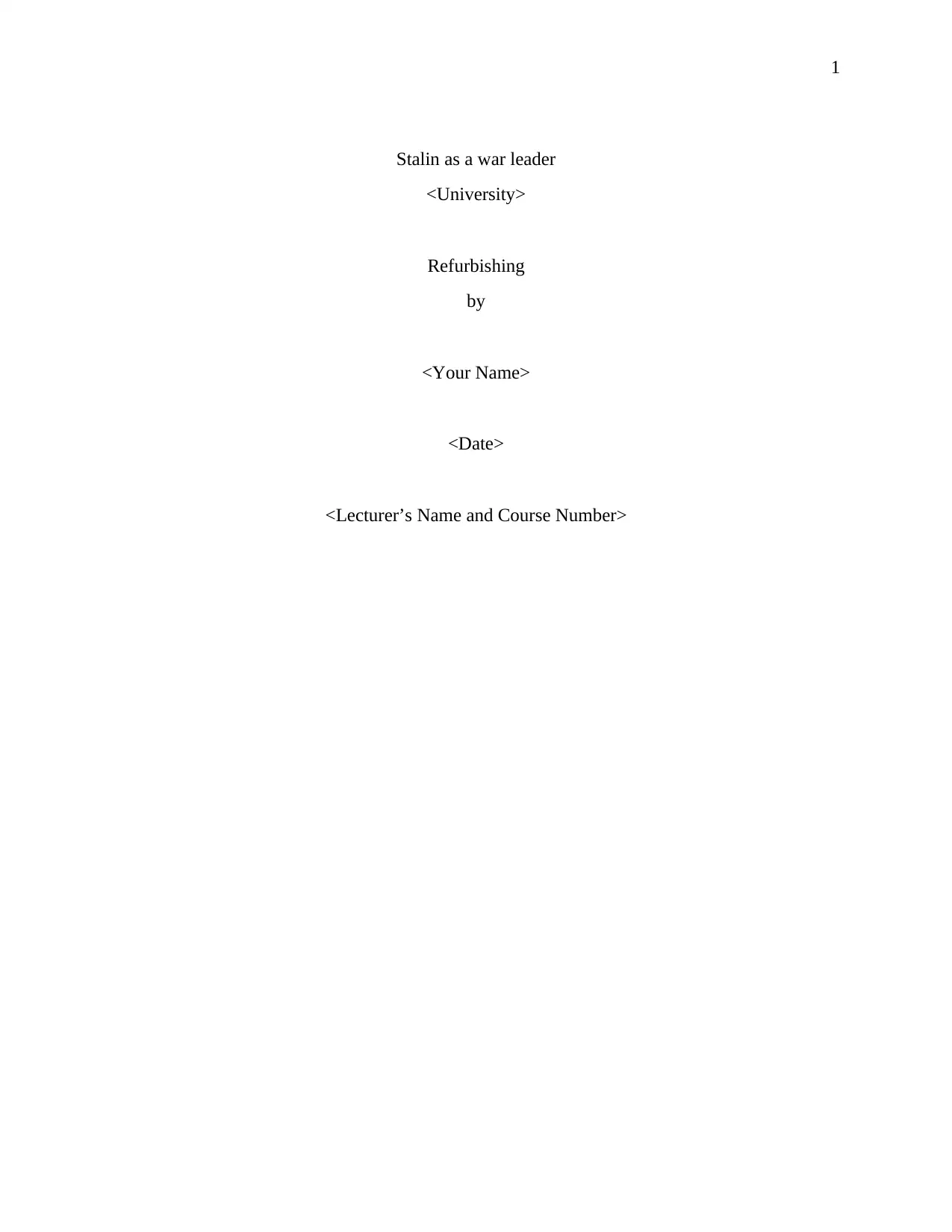
1
Stalin as a war leader
<University>
Refurbishing
by
<Your Name>
<Date>
<Lecturer’s Name and Course Number>
Stalin as a war leader
<University>
Refurbishing
by
<Your Name>
<Date>
<Lecturer’s Name and Course Number>
Paraphrase This Document
Need a fresh take? Get an instant paraphrase of this document with our AI Paraphraser
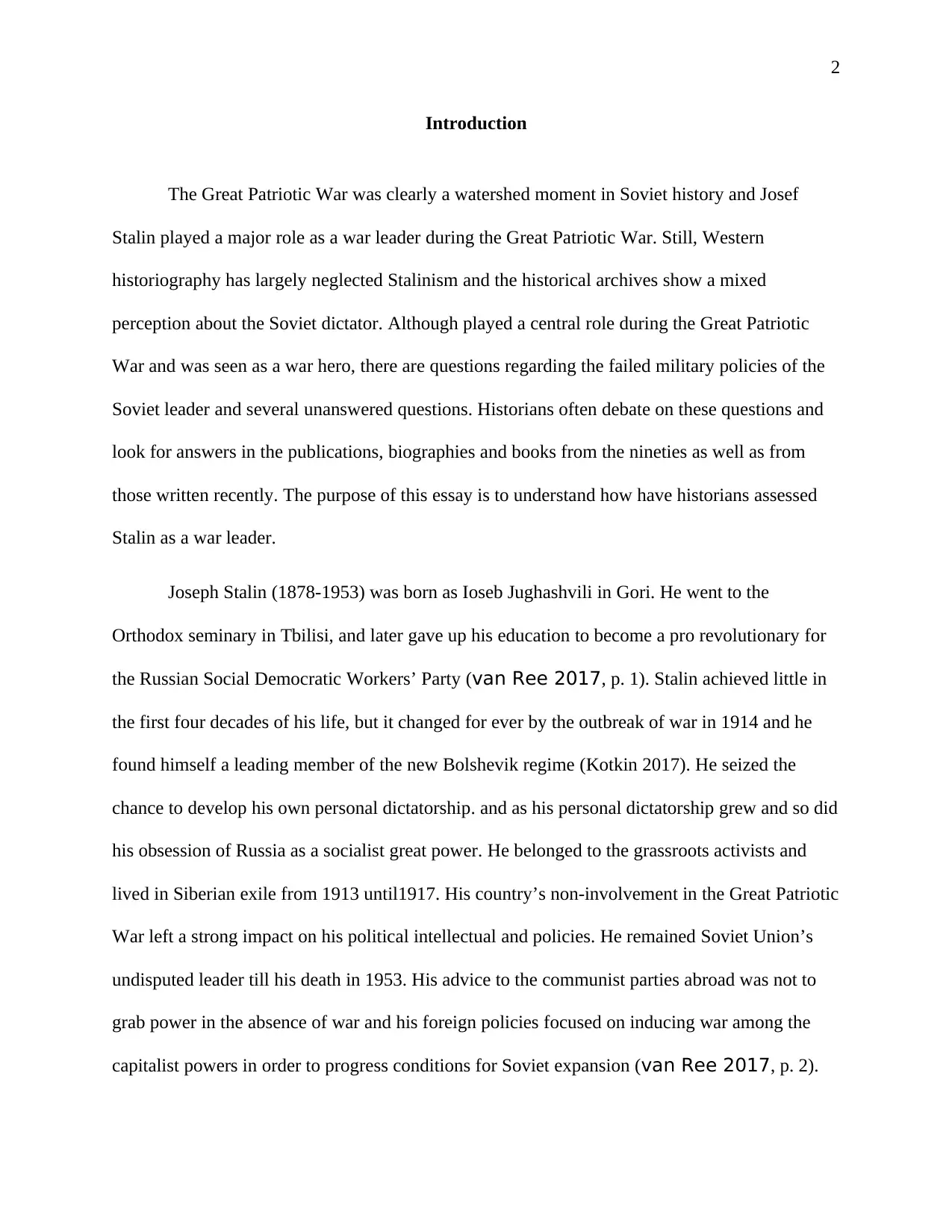
2
Introduction
The Great Patriotic War was clearly a watershed moment in Soviet history and Josef
Stalin played a major role as a war leader during the Great Patriotic War. Still, Western
historiography has largely neglected Stalinism and the historical archives show a mixed
perception about the Soviet dictator. Although played a central role during the Great Patriotic
War and was seen as a war hero, there are questions regarding the failed military policies of the
Soviet leader and several unanswered questions. Historians often debate on these questions and
look for answers in the publications, biographies and books from the nineties as well as from
those written recently. The purpose of this essay is to understand how have historians assessed
Stalin as a war leader.
Joseph Stalin (1878-1953) was born as Ioseb Jughashvili in Gori. He went to the
Orthodox seminary in Tbilisi, and later gave up his education to become a pro revolutionary for
the Russian Social Democratic Workers’ Party (van Ree 2017, p. 1). Stalin achieved little in
the first four decades of his life, but it changed for ever by the outbreak of war in 1914 and he
found himself a leading member of the new Bolshevik regime (Kotkin 2017). He seized the
chance to develop his own personal dictatorship. and as his personal dictatorship grew and so did
his obsession of Russia as a socialist great power. He belonged to the grassroots activists and
lived in Siberian exile from 1913 until1917. His country’s non-involvement in the Great Patriotic
War left a strong impact on his political intellectual and policies. He remained Soviet Union’s
undisputed leader till his death in 1953. His advice to the communist parties abroad was not to
grab power in the absence of war and his foreign policies focused on inducing war among the
capitalist powers in order to progress conditions for Soviet expansion (van Ree 2017, p. 2).
Introduction
The Great Patriotic War was clearly a watershed moment in Soviet history and Josef
Stalin played a major role as a war leader during the Great Patriotic War. Still, Western
historiography has largely neglected Stalinism and the historical archives show a mixed
perception about the Soviet dictator. Although played a central role during the Great Patriotic
War and was seen as a war hero, there are questions regarding the failed military policies of the
Soviet leader and several unanswered questions. Historians often debate on these questions and
look for answers in the publications, biographies and books from the nineties as well as from
those written recently. The purpose of this essay is to understand how have historians assessed
Stalin as a war leader.
Joseph Stalin (1878-1953) was born as Ioseb Jughashvili in Gori. He went to the
Orthodox seminary in Tbilisi, and later gave up his education to become a pro revolutionary for
the Russian Social Democratic Workers’ Party (van Ree 2017, p. 1). Stalin achieved little in
the first four decades of his life, but it changed for ever by the outbreak of war in 1914 and he
found himself a leading member of the new Bolshevik regime (Kotkin 2017). He seized the
chance to develop his own personal dictatorship. and as his personal dictatorship grew and so did
his obsession of Russia as a socialist great power. He belonged to the grassroots activists and
lived in Siberian exile from 1913 until1917. His country’s non-involvement in the Great Patriotic
War left a strong impact on his political intellectual and policies. He remained Soviet Union’s
undisputed leader till his death in 1953. His advice to the communist parties abroad was not to
grab power in the absence of war and his foreign policies focused on inducing war among the
capitalist powers in order to progress conditions for Soviet expansion (van Ree 2017, p. 2).
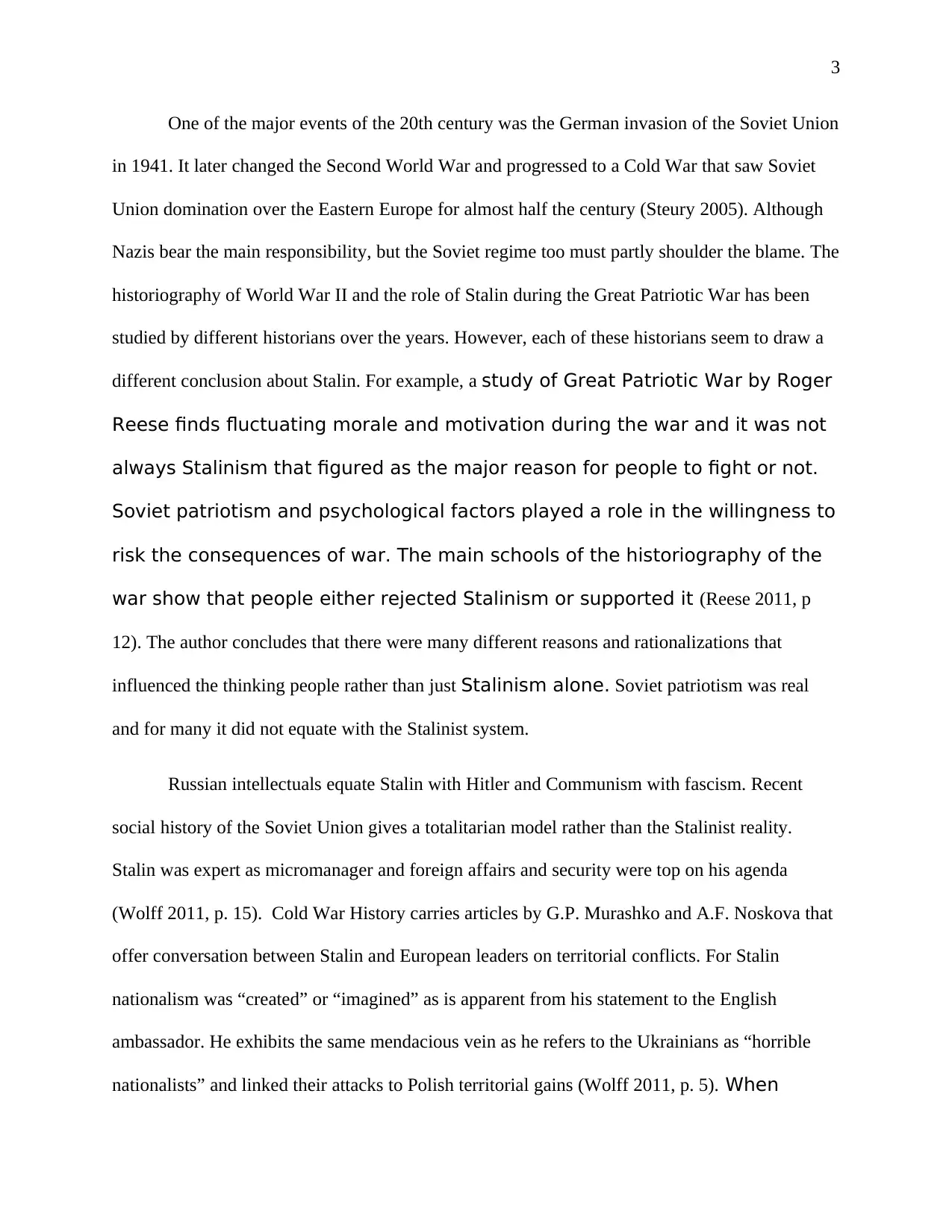
3
One of the major events of the 20th century was the German invasion of the Soviet Union
in 1941. It later changed the Second World War and progressed to a Cold War that saw Soviet
Union domination over the Eastern Europe for almost half the century (Steury 2005). Although
Nazis bear the main responsibility, but the Soviet regime too must partly shoulder the blame. The
historiography of World War II and the role of Stalin during the Great Patriotic War has been
studied by different historians over the years. However, each of these historians seem to draw a
different conclusion about Stalin. For example, a study of Great Patriotic War by Roger
Reese finds fluctuating morale and motivation during the war and it was not
always Stalinism that figured as the major reason for people to fight or not.
Soviet patriotism and psychological factors played a role in the willingness to
risk the consequences of war. The main schools of the historiography of the
war show that people either rejected Stalinism or supported it (Reese 2011, p
12). The author concludes that there were many different reasons and rationalizations that
influenced the thinking people rather than just Stalinism alone. Soviet patriotism was real
and for many it did not equate with the Stalinist system.
Russian intellectuals equate Stalin with Hitler and Communism with fascism. Recent
social history of the Soviet Union gives a totalitarian model rather than the Stalinist reality.
Stalin was expert as micromanager and foreign affairs and security were top on his agenda
(Wolff 2011, p. 15). Cold War History carries articles by G.P. Murashko and A.F. Noskova that
offer conversation between Stalin and European leaders on territorial conflicts. For Stalin
nationalism was “created” or “imagined” as is apparent from his statement to the English
ambassador. He exhibits the same mendacious vein as he refers to the Ukrainians as “horrible
nationalists” and linked their attacks to Polish territorial gains (Wolff 2011, p. 5). When
One of the major events of the 20th century was the German invasion of the Soviet Union
in 1941. It later changed the Second World War and progressed to a Cold War that saw Soviet
Union domination over the Eastern Europe for almost half the century (Steury 2005). Although
Nazis bear the main responsibility, but the Soviet regime too must partly shoulder the blame. The
historiography of World War II and the role of Stalin during the Great Patriotic War has been
studied by different historians over the years. However, each of these historians seem to draw a
different conclusion about Stalin. For example, a study of Great Patriotic War by Roger
Reese finds fluctuating morale and motivation during the war and it was not
always Stalinism that figured as the major reason for people to fight or not.
Soviet patriotism and psychological factors played a role in the willingness to
risk the consequences of war. The main schools of the historiography of the
war show that people either rejected Stalinism or supported it (Reese 2011, p
12). The author concludes that there were many different reasons and rationalizations that
influenced the thinking people rather than just Stalinism alone. Soviet patriotism was real
and for many it did not equate with the Stalinist system.
Russian intellectuals equate Stalin with Hitler and Communism with fascism. Recent
social history of the Soviet Union gives a totalitarian model rather than the Stalinist reality.
Stalin was expert as micromanager and foreign affairs and security were top on his agenda
(Wolff 2011, p. 15). Cold War History carries articles by G.P. Murashko and A.F. Noskova that
offer conversation between Stalin and European leaders on territorial conflicts. For Stalin
nationalism was “created” or “imagined” as is apparent from his statement to the English
ambassador. He exhibits the same mendacious vein as he refers to the Ukrainians as “horrible
nationalists” and linked their attacks to Polish territorial gains (Wolff 2011, p. 5). When
⊘ This is a preview!⊘
Do you want full access?
Subscribe today to unlock all pages.

Trusted by 1+ million students worldwide
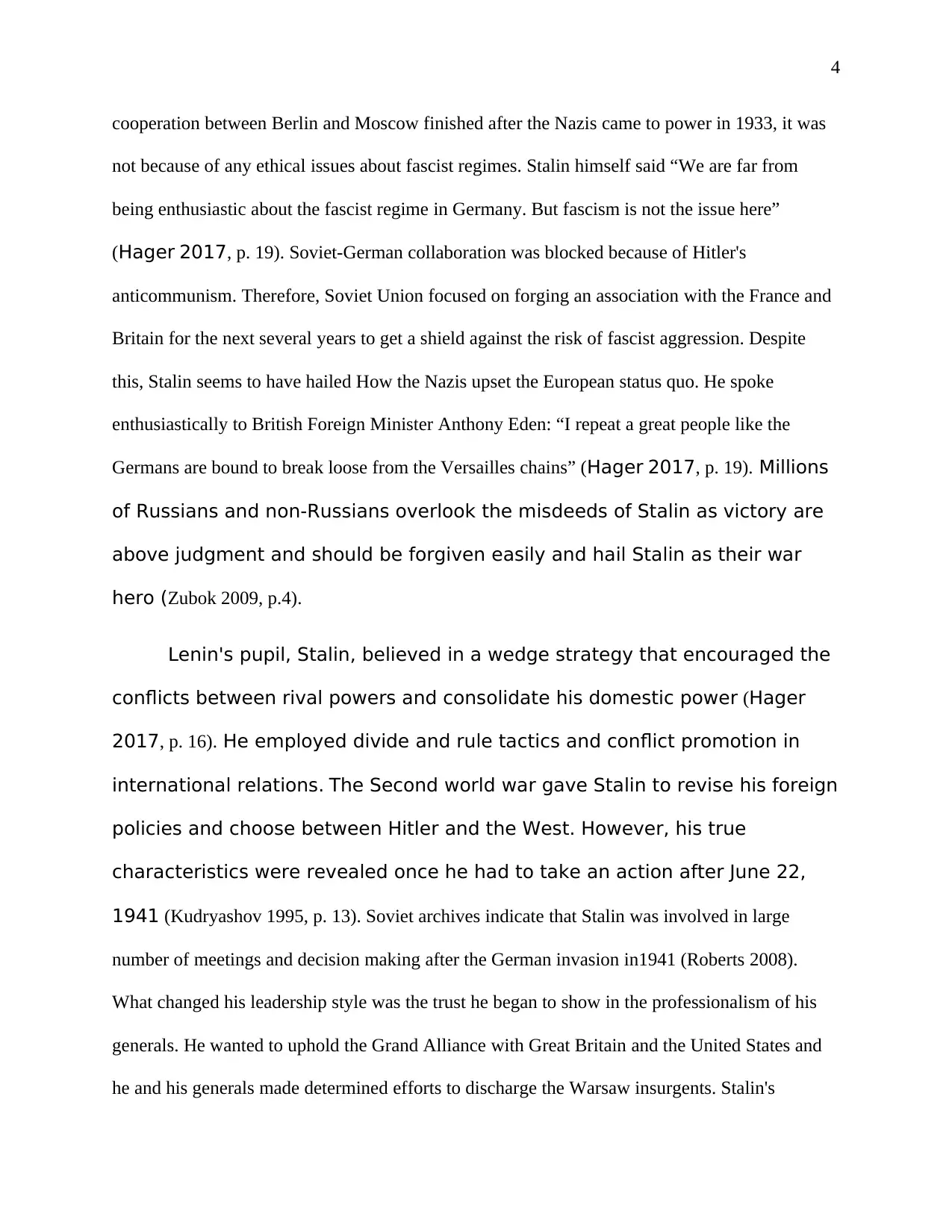
4
cooperation between Berlin and Moscow finished after the Nazis came to power in 1933, it was
not because of any ethical issues about fascist regimes. Stalin himself said “We are far from
being enthusiastic about the fascist regime in Germany. But fascism is not the issue here”
(Hager 2017, p. 19). Soviet-German collaboration was blocked because of Hitler's
anticommunism. Therefore, Soviet Union focused on forging an association with the France and
Britain for the next several years to get a shield against the risk of fascist aggression. Despite
this, Stalin seems to have hailed How the Nazis upset the European status quo. He spoke
enthusiastically to British Foreign Minister Anthony Eden: “I repeat a great people like the
Germans are bound to break loose from the Versailles chains” (Hager 2017, p. 19). Millions
of Russians and non-Russians overlook the misdeeds of Stalin as victory are
above judgment and should be forgiven easily and hail Stalin as their war
hero (Zubok 2009, p.4).
Lenin's pupil, Stalin, believed in a wedge strategy that encouraged the
conflicts between rival powers and consolidate his domestic power (Hager
2017, p. 16). He employed divide and rule tactics and conflict promotion in
international relations. The Second world war gave Stalin to revise his foreign
policies and choose between Hitler and the West. However, his true
characteristics were revealed once he had to take an action after June 22,
1941 (Kudryashov 1995, p. 13). Soviet archives indicate that Stalin was involved in large
number of meetings and decision making after the German invasion in1941 (Roberts 2008).
What changed his leadership style was the trust he began to show in the professionalism of his
generals. He wanted to uphold the Grand Alliance with Great Britain and the United States and
he and his generals made determined efforts to discharge the Warsaw insurgents. Stalin's
cooperation between Berlin and Moscow finished after the Nazis came to power in 1933, it was
not because of any ethical issues about fascist regimes. Stalin himself said “We are far from
being enthusiastic about the fascist regime in Germany. But fascism is not the issue here”
(Hager 2017, p. 19). Soviet-German collaboration was blocked because of Hitler's
anticommunism. Therefore, Soviet Union focused on forging an association with the France and
Britain for the next several years to get a shield against the risk of fascist aggression. Despite
this, Stalin seems to have hailed How the Nazis upset the European status quo. He spoke
enthusiastically to British Foreign Minister Anthony Eden: “I repeat a great people like the
Germans are bound to break loose from the Versailles chains” (Hager 2017, p. 19). Millions
of Russians and non-Russians overlook the misdeeds of Stalin as victory are
above judgment and should be forgiven easily and hail Stalin as their war
hero (Zubok 2009, p.4).
Lenin's pupil, Stalin, believed in a wedge strategy that encouraged the
conflicts between rival powers and consolidate his domestic power (Hager
2017, p. 16). He employed divide and rule tactics and conflict promotion in
international relations. The Second world war gave Stalin to revise his foreign
policies and choose between Hitler and the West. However, his true
characteristics were revealed once he had to take an action after June 22,
1941 (Kudryashov 1995, p. 13). Soviet archives indicate that Stalin was involved in large
number of meetings and decision making after the German invasion in1941 (Roberts 2008).
What changed his leadership style was the trust he began to show in the professionalism of his
generals. He wanted to uphold the Grand Alliance with Great Britain and the United States and
he and his generals made determined efforts to discharge the Warsaw insurgents. Stalin's
Paraphrase This Document
Need a fresh take? Get an instant paraphrase of this document with our AI Paraphraser
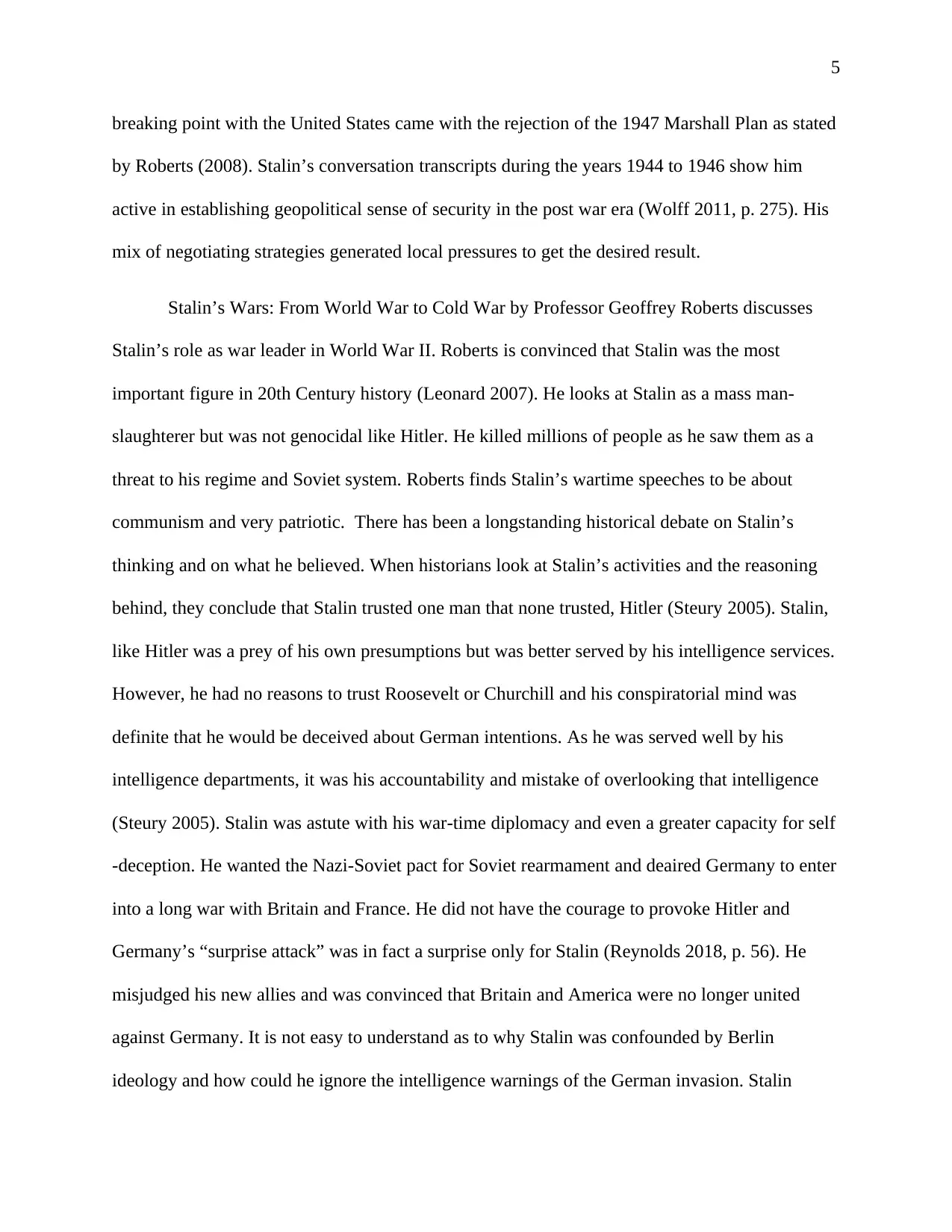
5
breaking point with the United States came with the rejection of the 1947 Marshall Plan as stated
by Roberts (2008). Stalin’s conversation transcripts during the years 1944 to 1946 show him
active in establishing geopolitical sense of security in the post war era (Wolff 2011, p. 275). His
mix of negotiating strategies generated local pressures to get the desired result.
Stalin’s Wars: From World War to Cold War by Professor Geoffrey Roberts discusses
Stalin’s role as war leader in World War II. Roberts is convinced that Stalin was the most
important figure in 20th Century history (Leonard 2007). He looks at Stalin as a mass man-
slaughterer but was not genocidal like Hitler. He killed millions of people as he saw them as a
threat to his regime and Soviet system. Roberts finds Stalin’s wartime speeches to be about
communism and very patriotic. There has been a longstanding historical debate on Stalin’s
thinking and on what he believed. When historians look at Stalin’s activities and the reasoning
behind, they conclude that Stalin trusted one man that none trusted, Hitler (Steury 2005). Stalin,
like Hitler was a prey of his own presumptions but was better served by his intelligence services.
However, he had no reasons to trust Roosevelt or Churchill and his conspiratorial mind was
definite that he would be deceived about German intentions. As he was served well by his
intelligence departments, it was his accountability and mistake of overlooking that intelligence
(Steury 2005). Stalin was astute with his war-time diplomacy and even a greater capacity for self
-deception. He wanted the Nazi-Soviet pact for Soviet rearmament and deaired Germany to enter
into a long war with Britain and France. He did not have the courage to provoke Hitler and
Germany’s “surprise attack” was in fact a surprise only for Stalin (Reynolds 2018, p. 56). He
misjudged his new allies and was convinced that Britain and America were no longer united
against Germany. It is not easy to understand as to why Stalin was confounded by Berlin
ideology and how could he ignore the intelligence warnings of the German invasion. Stalin
breaking point with the United States came with the rejection of the 1947 Marshall Plan as stated
by Roberts (2008). Stalin’s conversation transcripts during the years 1944 to 1946 show him
active in establishing geopolitical sense of security in the post war era (Wolff 2011, p. 275). His
mix of negotiating strategies generated local pressures to get the desired result.
Stalin’s Wars: From World War to Cold War by Professor Geoffrey Roberts discusses
Stalin’s role as war leader in World War II. Roberts is convinced that Stalin was the most
important figure in 20th Century history (Leonard 2007). He looks at Stalin as a mass man-
slaughterer but was not genocidal like Hitler. He killed millions of people as he saw them as a
threat to his regime and Soviet system. Roberts finds Stalin’s wartime speeches to be about
communism and very patriotic. There has been a longstanding historical debate on Stalin’s
thinking and on what he believed. When historians look at Stalin’s activities and the reasoning
behind, they conclude that Stalin trusted one man that none trusted, Hitler (Steury 2005). Stalin,
like Hitler was a prey of his own presumptions but was better served by his intelligence services.
However, he had no reasons to trust Roosevelt or Churchill and his conspiratorial mind was
definite that he would be deceived about German intentions. As he was served well by his
intelligence departments, it was his accountability and mistake of overlooking that intelligence
(Steury 2005). Stalin was astute with his war-time diplomacy and even a greater capacity for self
-deception. He wanted the Nazi-Soviet pact for Soviet rearmament and deaired Germany to enter
into a long war with Britain and France. He did not have the courage to provoke Hitler and
Germany’s “surprise attack” was in fact a surprise only for Stalin (Reynolds 2018, p. 56). He
misjudged his new allies and was convinced that Britain and America were no longer united
against Germany. It is not easy to understand as to why Stalin was confounded by Berlin
ideology and how could he ignore the intelligence warnings of the German invasion. Stalin
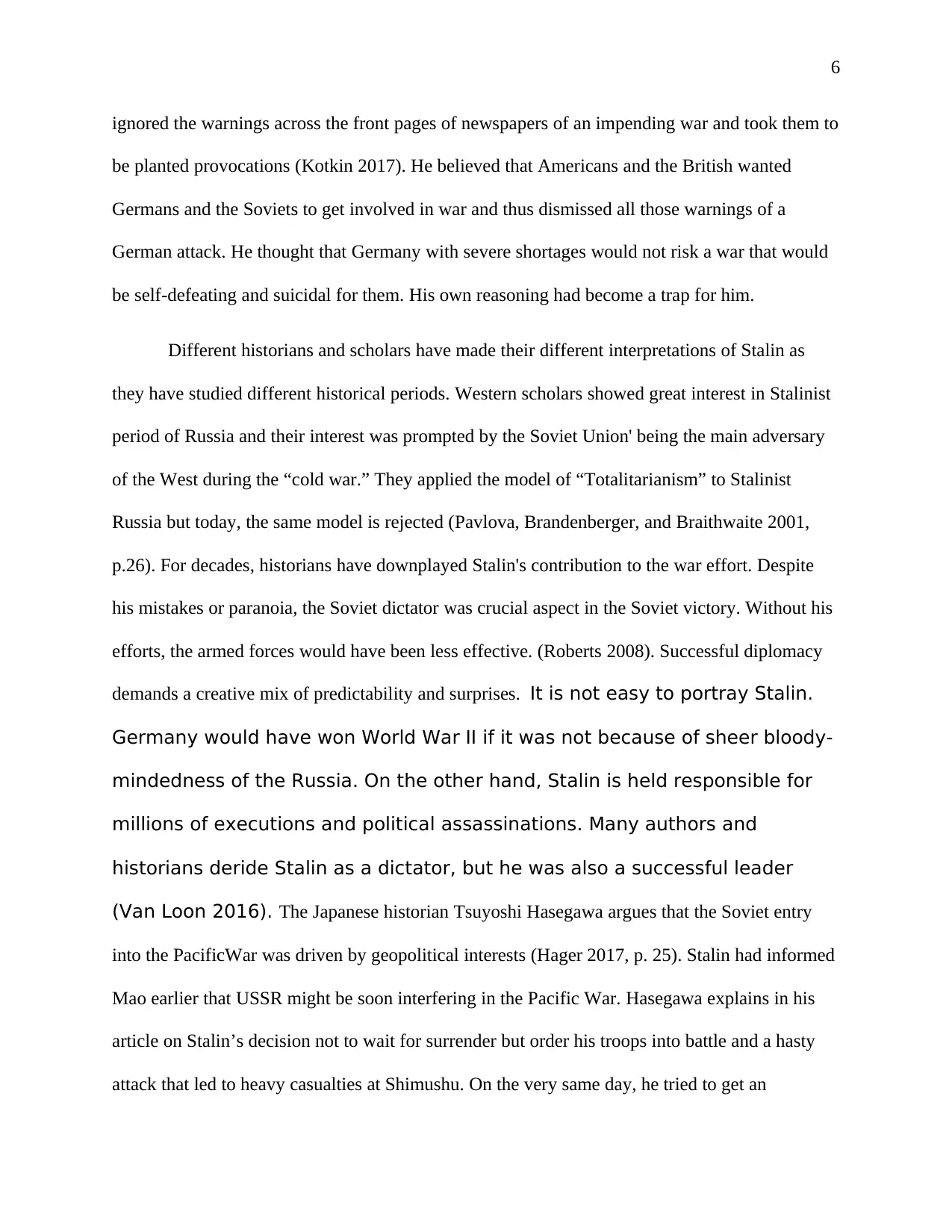
6
ignored the warnings across the front pages of newspapers of an impending war and took them to
be planted provocations (Kotkin 2017). He believed that Americans and the British wanted
Germans and the Soviets to get involved in war and thus dismissed all those warnings of a
German attack. He thought that Germany with severe shortages would not risk a war that would
be self-defeating and suicidal for them. His own reasoning had become a trap for him.
Different historians and scholars have made their different interpretations of Stalin as
they have studied different historical periods. Western scholars showed great interest in Stalinist
period of Russia and their interest was prompted by the Soviet Union' being the main adversary
of the West during the “cold war.” They applied the model of “Totalitarianism” to Stalinist
Russia but today, the same model is rejected (Pavlova, Brandenberger, and Braithwaite 2001,
p.26). For decades, historians have downplayed Stalin's contribution to the war effort. Despite
his mistakes or paranoia, the Soviet dictator was crucial aspect in the Soviet victory. Without his
efforts, the armed forces would have been less effective. (Roberts 2008). Successful diplomacy
demands a creative mix of predictability and surprises. It is not easy to portray Stalin.
Germany would have won World War II if it was not because of sheer bloody-
mindedness of the Russia. On the other hand, Stalin is held responsible for
millions of executions and political assassinations. Many authors and
historians deride Stalin as a dictator, but he was also a successful leader
(Van Loon 2016). The Japanese historian Tsuyoshi Hasegawa argues that the Soviet entry
into the PacificWar was driven by geopolitical interests (Hager 2017, p. 25). Stalin had informed
Mao earlier that USSR might be soon interfering in the Pacific War. Hasegawa explains in his
article on Stalin’s decision not to wait for surrender but order his troops into battle and a hasty
attack that led to heavy casualties at Shimushu. On the very same day, he tried to get an
ignored the warnings across the front pages of newspapers of an impending war and took them to
be planted provocations (Kotkin 2017). He believed that Americans and the British wanted
Germans and the Soviets to get involved in war and thus dismissed all those warnings of a
German attack. He thought that Germany with severe shortages would not risk a war that would
be self-defeating and suicidal for them. His own reasoning had become a trap for him.
Different historians and scholars have made their different interpretations of Stalin as
they have studied different historical periods. Western scholars showed great interest in Stalinist
period of Russia and their interest was prompted by the Soviet Union' being the main adversary
of the West during the “cold war.” They applied the model of “Totalitarianism” to Stalinist
Russia but today, the same model is rejected (Pavlova, Brandenberger, and Braithwaite 2001,
p.26). For decades, historians have downplayed Stalin's contribution to the war effort. Despite
his mistakes or paranoia, the Soviet dictator was crucial aspect in the Soviet victory. Without his
efforts, the armed forces would have been less effective. (Roberts 2008). Successful diplomacy
demands a creative mix of predictability and surprises. It is not easy to portray Stalin.
Germany would have won World War II if it was not because of sheer bloody-
mindedness of the Russia. On the other hand, Stalin is held responsible for
millions of executions and political assassinations. Many authors and
historians deride Stalin as a dictator, but he was also a successful leader
(Van Loon 2016). The Japanese historian Tsuyoshi Hasegawa argues that the Soviet entry
into the PacificWar was driven by geopolitical interests (Hager 2017, p. 25). Stalin had informed
Mao earlier that USSR might be soon interfering in the Pacific War. Hasegawa explains in his
article on Stalin’s decision not to wait for surrender but order his troops into battle and a hasty
attack that led to heavy casualties at Shimushu. On the very same day, he tried to get an
⊘ This is a preview!⊘
Do you want full access?
Subscribe today to unlock all pages.

Trusted by 1+ million students worldwide
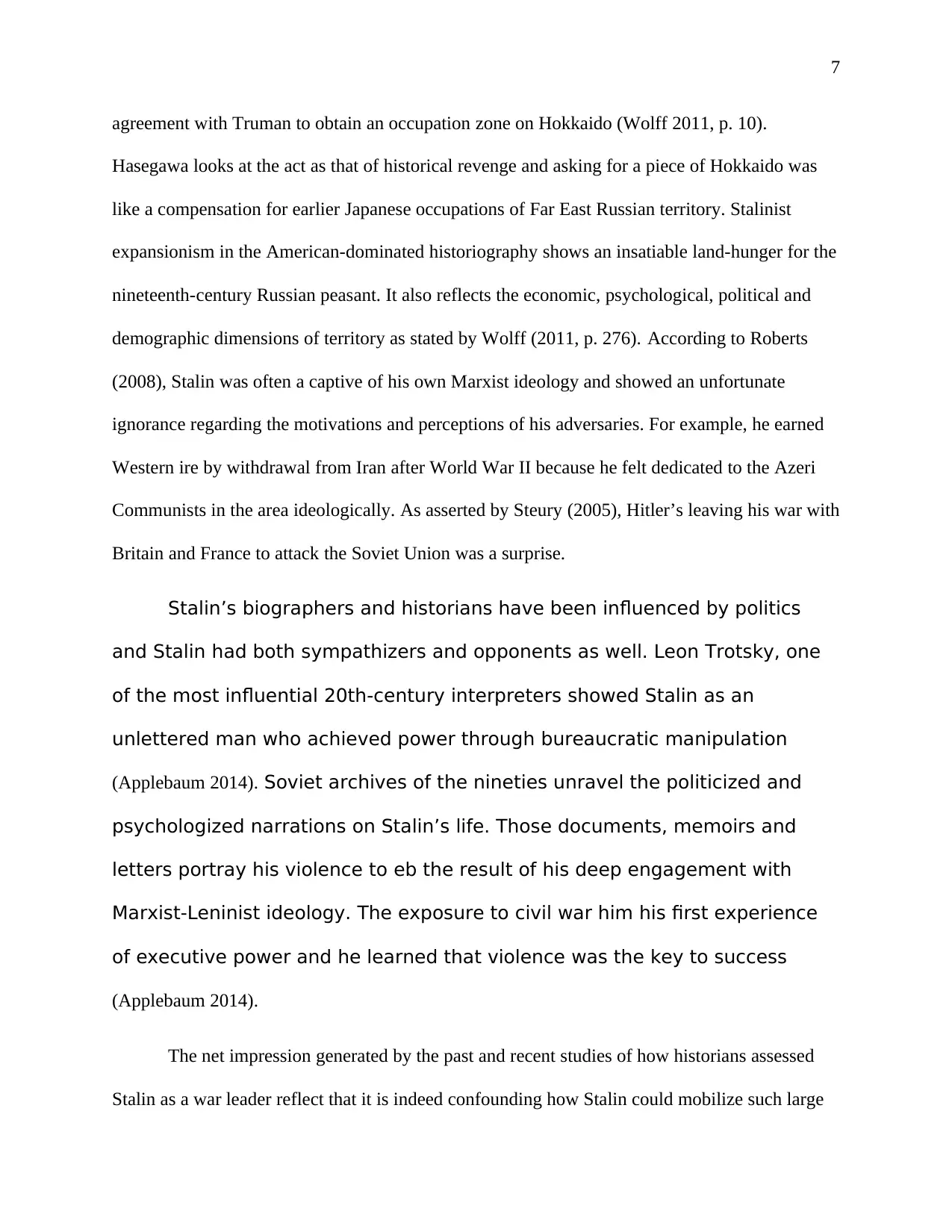
7
agreement with Truman to obtain an occupation zone on Hokkaido (Wolff 2011, p. 10).
Hasegawa looks at the act as that of historical revenge and asking for a piece of Hokkaido was
like a compensation for earlier Japanese occupations of Far East Russian territory. Stalinist
expansionism in the American-dominated historiography shows an insatiable land-hunger for the
nineteenth-century Russian peasant. It also reflects the economic, psychological, political and
demographic dimensions of territory as stated by Wolff (2011, p. 276). According to Roberts
(2008), Stalin was often a captive of his own Marxist ideology and showed an unfortunate
ignorance regarding the motivations and perceptions of his adversaries. For example, he earned
Western ire by withdrawal from Iran after World War II because he felt dedicated to the Azeri
Communists in the area ideologically. As asserted by Steury (2005), Hitler’s leaving his war with
Britain and France to attack the Soviet Union was a surprise.
Stalin’s biographers and historians have been influenced by politics
and Stalin had both sympathizers and opponents as well. Leon Trotsky, one
of the most influential 20th-century interpreters showed Stalin as an
unlettered man who achieved power through bureaucratic manipulation
(Applebaum 2014). Soviet archives of the nineties unravel the politicized and
psychologized narrations on Stalin’s life. Those documents, memoirs and
letters portray his violence to eb the result of his deep engagement with
Marxist-Leninist ideology. The exposure to civil war him his first experience
of executive power and he learned that violence was the key to success
(Applebaum 2014).
The net impression generated by the past and recent studies of how historians assessed
Stalin as a war leader reflect that it is indeed confounding how Stalin could mobilize such large
agreement with Truman to obtain an occupation zone on Hokkaido (Wolff 2011, p. 10).
Hasegawa looks at the act as that of historical revenge and asking for a piece of Hokkaido was
like a compensation for earlier Japanese occupations of Far East Russian territory. Stalinist
expansionism in the American-dominated historiography shows an insatiable land-hunger for the
nineteenth-century Russian peasant. It also reflects the economic, psychological, political and
demographic dimensions of territory as stated by Wolff (2011, p. 276). According to Roberts
(2008), Stalin was often a captive of his own Marxist ideology and showed an unfortunate
ignorance regarding the motivations and perceptions of his adversaries. For example, he earned
Western ire by withdrawal from Iran after World War II because he felt dedicated to the Azeri
Communists in the area ideologically. As asserted by Steury (2005), Hitler’s leaving his war with
Britain and France to attack the Soviet Union was a surprise.
Stalin’s biographers and historians have been influenced by politics
and Stalin had both sympathizers and opponents as well. Leon Trotsky, one
of the most influential 20th-century interpreters showed Stalin as an
unlettered man who achieved power through bureaucratic manipulation
(Applebaum 2014). Soviet archives of the nineties unravel the politicized and
psychologized narrations on Stalin’s life. Those documents, memoirs and
letters portray his violence to eb the result of his deep engagement with
Marxist-Leninist ideology. The exposure to civil war him his first experience
of executive power and he learned that violence was the key to success
(Applebaum 2014).
The net impression generated by the past and recent studies of how historians assessed
Stalin as a war leader reflect that it is indeed confounding how Stalin could mobilize such large
Paraphrase This Document
Need a fresh take? Get an instant paraphrase of this document with our AI Paraphraser
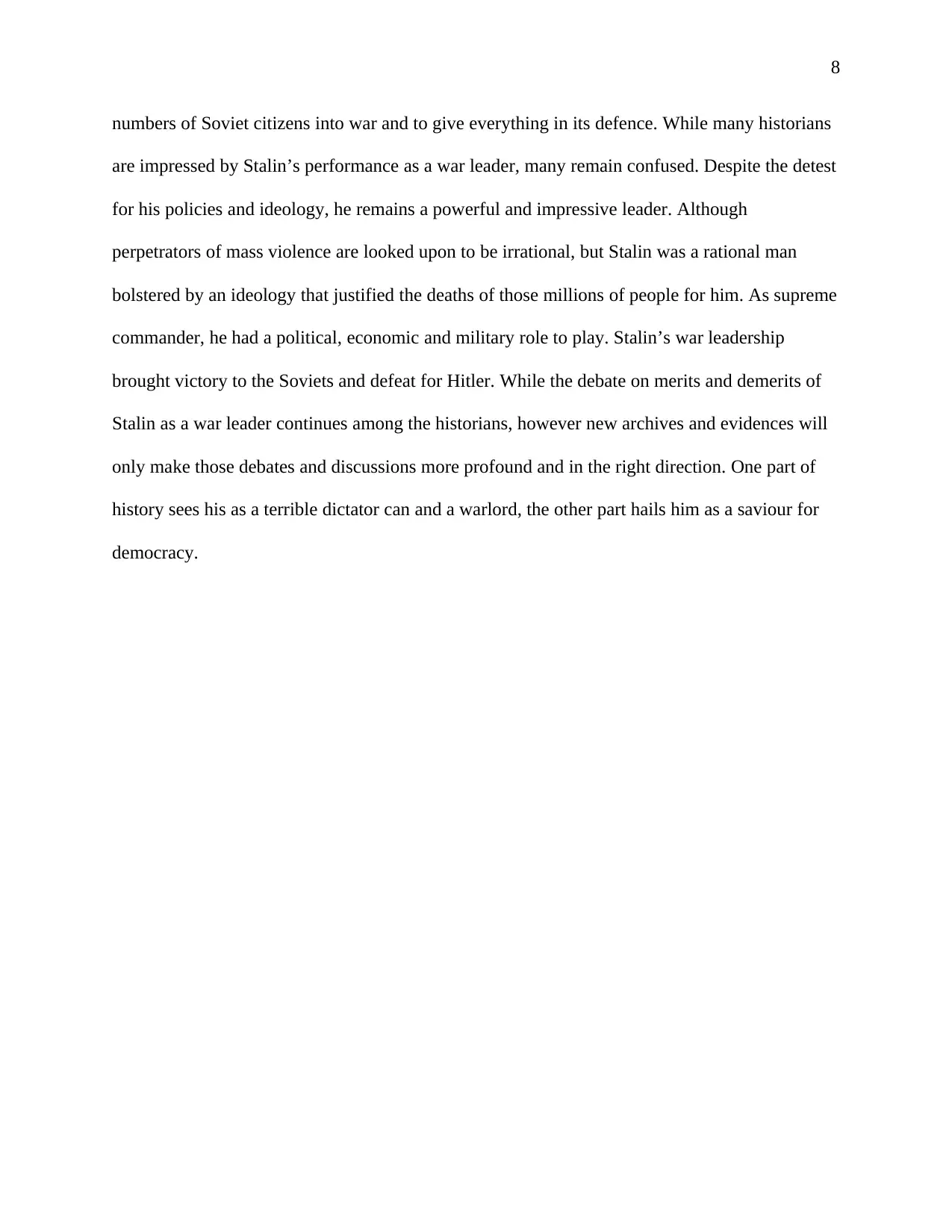
8
numbers of Soviet citizens into war and to give everything in its defence. While many historians
are impressed by Stalin’s performance as a war leader, many remain confused. Despite the detest
for his policies and ideology, he remains a powerful and impressive leader. Although
perpetrators of mass violence are looked upon to be irrational, but Stalin was a rational man
bolstered by an ideology that justified the deaths of those millions of people for him. As supreme
commander, he had a political, economic and military role to play. Stalin’s war leadership
brought victory to the Soviets and defeat for Hitler. While the debate on merits and demerits of
Stalin as a war leader continues among the historians, however new archives and evidences will
only make those debates and discussions more profound and in the right direction. One part of
history sees his as a terrible dictator can and a warlord, the other part hails him as a saviour for
democracy.
numbers of Soviet citizens into war and to give everything in its defence. While many historians
are impressed by Stalin’s performance as a war leader, many remain confused. Despite the detest
for his policies and ideology, he remains a powerful and impressive leader. Although
perpetrators of mass violence are looked upon to be irrational, but Stalin was a rational man
bolstered by an ideology that justified the deaths of those millions of people for him. As supreme
commander, he had a political, economic and military role to play. Stalin’s war leadership
brought victory to the Soviets and defeat for Hitler. While the debate on merits and demerits of
Stalin as a war leader continues among the historians, however new archives and evidences will
only make those debates and discussions more profound and in the right direction. One part of
history sees his as a terrible dictator can and a warlord, the other part hails him as a saviour for
democracy.
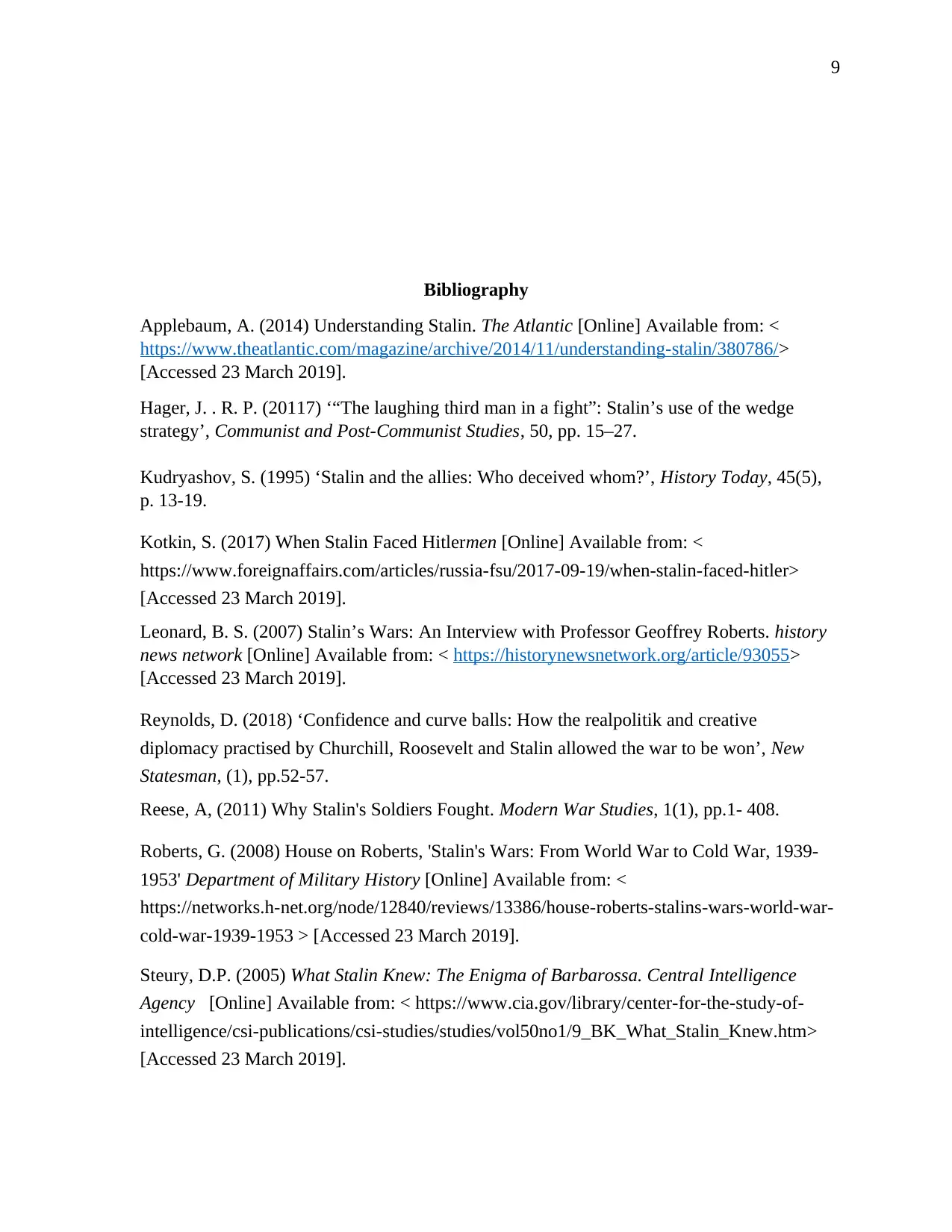
9
Bibliography
Applebaum, A. (2014) Understanding Stalin. The Atlantic [Online] Available from: <
https://www.theatlantic.com/magazine/archive/2014/11/understanding-stalin/380786/>
[Accessed 23 March 2019].
Hager, J. . R. P. (20117) ‘“The laughing third man in a fight”: Stalin’s use of the wedge
strategy’, Communist and Post-Communist Studies, 50, pp. 15–27.
Kudryashov, S. (1995) ‘Stalin and the allies: Who deceived whom?’, History Today, 45(5),
p. 13-19.
Kotkin, S. (2017) When Stalin Faced Hitlermen [Online] Available from: <
https://www.foreignaffairs.com/articles/russia-fsu/2017-09-19/when-stalin-faced-hitler>
[Accessed 23 March 2019].
Leonard, B. S. (2007) Stalin’s Wars: An Interview with Professor Geoffrey Roberts. history
news network [Online] Available from: < https://historynewsnetwork.org/article/93055>
[Accessed 23 March 2019].
Reynolds, D. (2018) ‘Confidence and curve balls: How the realpolitik and creative
diplomacy practised by Churchill, Roosevelt and Stalin allowed the war to be won’, New
Statesman, (1), pp.52-57.
Reese, A, (2011) Why Stalin's Soldiers Fought. Modern War Studies, 1(1), pp.1- 408.
Roberts, G. (2008) House on Roberts, 'Stalin's Wars: From World War to Cold War, 1939-
1953' Department of Military History [Online] Available from: <
https://networks.h-net.org/node/12840/reviews/13386/house-roberts-stalins-wars-world-war-
cold-war-1939-1953 > [Accessed 23 March 2019].
Steury, D.P. (2005) What Stalin Knew: The Enigma of Barbarossa. Central Intelligence
Agency [Online] Available from: < https://www.cia.gov/library/center-for-the-study-of-
intelligence/csi-publications/csi-studies/studies/vol50no1/9_BK_What_Stalin_Knew.htm>
[Accessed 23 March 2019].
Bibliography
Applebaum, A. (2014) Understanding Stalin. The Atlantic [Online] Available from: <
https://www.theatlantic.com/magazine/archive/2014/11/understanding-stalin/380786/>
[Accessed 23 March 2019].
Hager, J. . R. P. (20117) ‘“The laughing third man in a fight”: Stalin’s use of the wedge
strategy’, Communist and Post-Communist Studies, 50, pp. 15–27.
Kudryashov, S. (1995) ‘Stalin and the allies: Who deceived whom?’, History Today, 45(5),
p. 13-19.
Kotkin, S. (2017) When Stalin Faced Hitlermen [Online] Available from: <
https://www.foreignaffairs.com/articles/russia-fsu/2017-09-19/when-stalin-faced-hitler>
[Accessed 23 March 2019].
Leonard, B. S. (2007) Stalin’s Wars: An Interview with Professor Geoffrey Roberts. history
news network [Online] Available from: < https://historynewsnetwork.org/article/93055>
[Accessed 23 March 2019].
Reynolds, D. (2018) ‘Confidence and curve balls: How the realpolitik and creative
diplomacy practised by Churchill, Roosevelt and Stalin allowed the war to be won’, New
Statesman, (1), pp.52-57.
Reese, A, (2011) Why Stalin's Soldiers Fought. Modern War Studies, 1(1), pp.1- 408.
Roberts, G. (2008) House on Roberts, 'Stalin's Wars: From World War to Cold War, 1939-
1953' Department of Military History [Online] Available from: <
https://networks.h-net.org/node/12840/reviews/13386/house-roberts-stalins-wars-world-war-
cold-war-1939-1953 > [Accessed 23 March 2019].
Steury, D.P. (2005) What Stalin Knew: The Enigma of Barbarossa. Central Intelligence
Agency [Online] Available from: < https://www.cia.gov/library/center-for-the-study-of-
intelligence/csi-publications/csi-studies/studies/vol50no1/9_BK_What_Stalin_Knew.htm>
[Accessed 23 March 2019].
⊘ This is a preview!⊘
Do you want full access?
Subscribe today to unlock all pages.

Trusted by 1+ million students worldwide
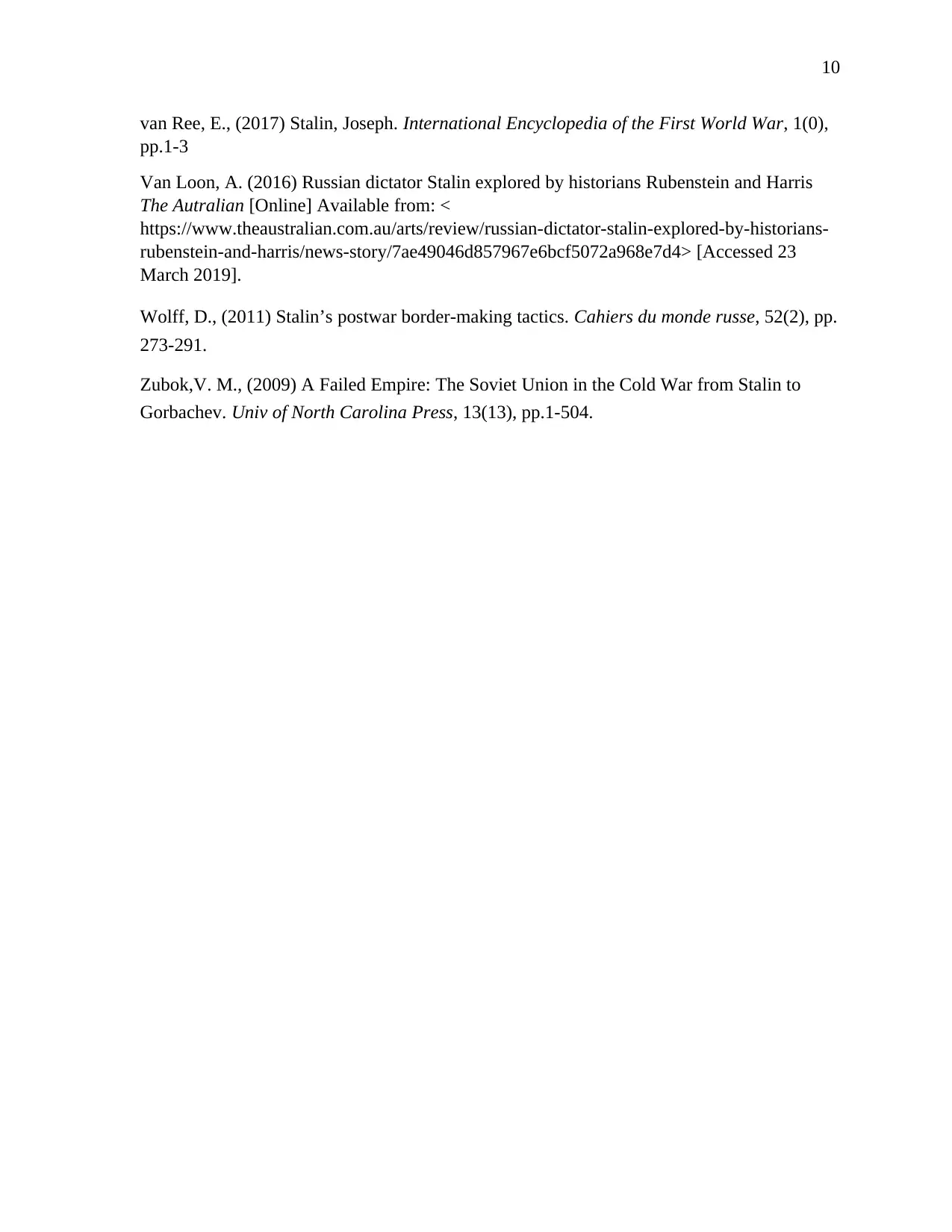
10
van Ree, E., (2017) Stalin, Joseph. International Encyclopedia of the First World War, 1(0),
pp.1-3
Van Loon, A. (2016) Russian dictator Stalin explored by historians Rubenstein and Harris
The Autralian [Online] Available from: <
https://www.theaustralian.com.au/arts/review/russian-dictator-stalin-explored-by-historians-
rubenstein-and-harris/news-story/7ae49046d857967e6bcf5072a968e7d4> [Accessed 23
March 2019].
Wolff, D., (2011) Stalin’s postwar border-making tactics. Cahiers du monde russe, 52(2), pp.
273-291.
Zubok,V. M., (2009) A Failed Empire: The Soviet Union in the Cold War from Stalin to
Gorbachev. Univ of North Carolina Press, 13(13), pp.1-504.
van Ree, E., (2017) Stalin, Joseph. International Encyclopedia of the First World War, 1(0),
pp.1-3
Van Loon, A. (2016) Russian dictator Stalin explored by historians Rubenstein and Harris
The Autralian [Online] Available from: <
https://www.theaustralian.com.au/arts/review/russian-dictator-stalin-explored-by-historians-
rubenstein-and-harris/news-story/7ae49046d857967e6bcf5072a968e7d4> [Accessed 23
March 2019].
Wolff, D., (2011) Stalin’s postwar border-making tactics. Cahiers du monde russe, 52(2), pp.
273-291.
Zubok,V. M., (2009) A Failed Empire: The Soviet Union in the Cold War from Stalin to
Gorbachev. Univ of North Carolina Press, 13(13), pp.1-504.
1 out of 10
Your All-in-One AI-Powered Toolkit for Academic Success.
+13062052269
info@desklib.com
Available 24*7 on WhatsApp / Email
![[object Object]](/_next/static/media/star-bottom.7253800d.svg)
Unlock your academic potential
Copyright © 2020–2026 A2Z Services. All Rights Reserved. Developed and managed by ZUCOL.


